The St. Louis Blues have arguably reached the pinnacle of their franchise in the last few seasons, winning the Stanley Cup for the first time in 2019. Even so, while they may not be the NHL’s most storied franchise, they have had some great players come through the Gateway City, either for most of a career (like Brett Hull) or for part of a season (like Wayne Gretzky).
At The Hockey Writers, we have been reviewing each franchise’s 100-point scorers one at a time. Since their debut in 1967, the Blues have had a player reach 100 points in a season 13 different times. It is a fascinating list full of some names you’d expect, and some others you might not even know played in St. Louis.
The Golden Brett
It will come as no surprise that the player most famously associated with the St. Louis Blues — especially in the aftermath of their Stanley Cup victory — is also their most prolific point producer, goal-scorer, and 100-point performer. Like his father Bobby Hull, “The Golden Brett” was as dynamic an offensive performer as the game had ever seen. He leads the Blues’ franchise in goals (527), is second in points (936), and is tied for first in 100-point seasons with four.
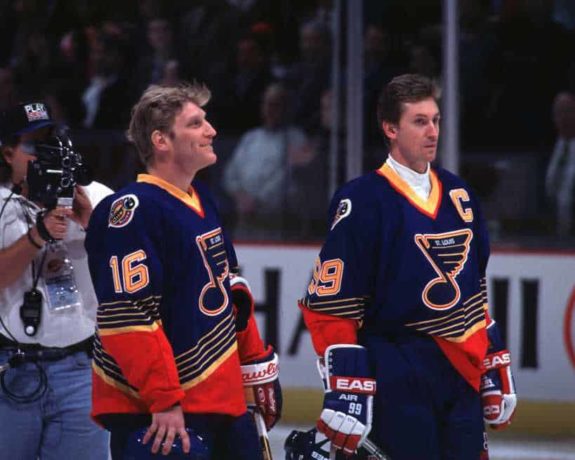
Hull had 100-plus points in four consecutive seasons. In 1989-90, he lodged 113 points in a “Cy Young” season where he had 72 goals and 41 assists. In 1990-91, he had the greatest offensive season in Blues’ history: he collected 86 goals and 45 assists for 131 points. Coincidentally, Hull’s 1990-91 season was arguably the greatest era-adjusted goal-scoring season in NHL history. He also collected the Hart Trophy and the Lester B. Pearson Award that season.
Hull added 109 points in 1991-92 (70 goals, 39 assists), and 101 points in 1992-93 (54 goals, 47 assists). He missed the century mark by just three points the following season and slowly ticked down from there. He finished his career after stints (and Stanley Cups) with the Dallas Stars and Detroit Red Wings (and five games with the Phoenix Coyotes). In 1,269 games, he had 741 goals and 650 assists for 1,391 points. He remains fourth in all-time goal scoring.
The Duo of Hull and Oates
For much of that string of 100-point seasons, Hull was not working alone. The Blues’ acquisition of Adam Oates — considered one of the worst trades in Detroit Red Wings history — cost them Bernie Federko, about whom we’ll talk in a moment. It was a steal for the Blues at the time. And on a team named after a musical genre, the pair of young stars quickly formed the legendary hockey duo known as Hull and Oates.
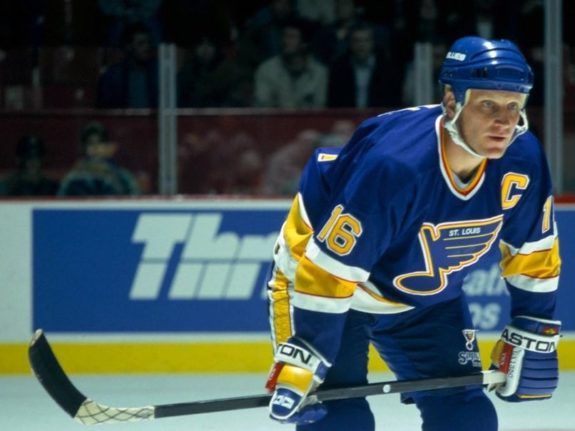
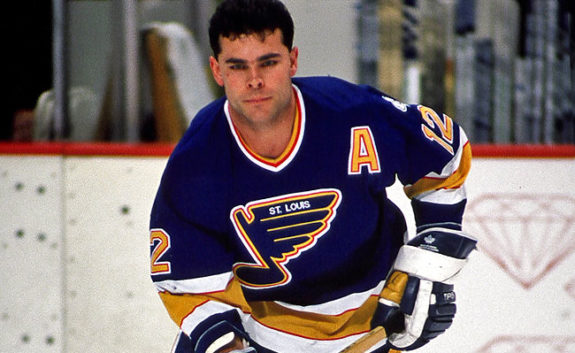
Given their place in Blues lore, it might surprise younger fans that the two played together for just over two and a half seasons between 1989 and 1992. But in that time they were electric. In 212 games playing together, Hull scored 212 goals and Oates offered 228 assists. They had a chemistry that few linemates in NHL history have ever had.
To be able to play with a guy that loved to set up a goal as much or more than score a goal, how can you ask for anything more than that?… He was so smart, so hockey smart, that he saw things in where to go and how to beat guys that I didn’t even fathom — and I thought I knew the game. He saw what everybody was doing, on our team and on their team. It was a treat to play with him.
Brett Hull on his partnership with Adam Oates
That pairing gave Oates two 100-point seasons with the Blues. In his debut 1989-90 season, he had 23 goals and 79 assists for 102 points. The following season, as Hull posted the best offensive season in Blues history, Oates climbed to the number two spot. His 115 points came off 25 goals and 90 assists.
Their hand forced somewhat by a contract dispute, the Blues would trade Oates before the deadline the following year. Though they received Craig Janney in return, another player we’ll speak about shortly, it was arguably one of the worst trades in Blues history. Oates finished that split season with 99 points between the Blues and the Boston Bruins.
Bernie Federko: The Overlooked Legend
If you’re not a Blues fan, there’s a decent chance that Federko is the greatest hockey player you’ve never heard of. The iconic Blues’ forward, who still has a visible presence with the team working on the local TV broadcast, scored 1,130 goals in exactly 1,000 career games. All but 73 of those games and 57 of those points came with the Blues before he was traded for Oates prior to his final season. Federko’s career 1.13 point per game pace still ranks 18th all-time amongst NHL players.
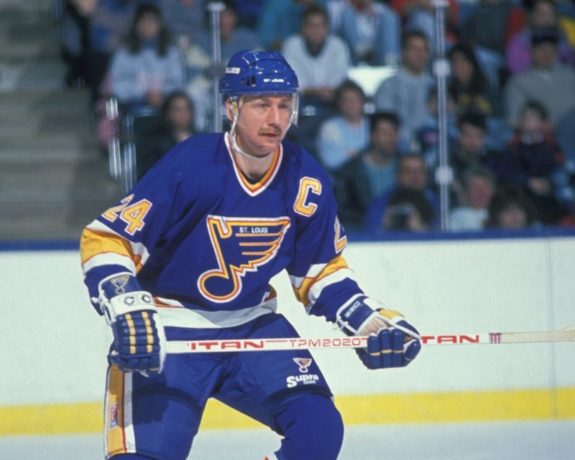
Federko is tied with Hull with four 100-plus point seasons, and three of his came consecutively. He began in the 1980-81 season with 104 points (31 goals, 73 assists) in 78 games. He had more than a point per game in each of the following two seasons, but would not reach 100 again until 1983-84 when he’d collect 107 points with 41 goals (his only 40-plus goal season) and 66 assists.
Federko reached the 100-point threshold in each of the following two seasons as well. He had 103 points (30 goals, 73 assists) in 1984-85 and 102 points (34 goals, 68 assists) the following season. He would get close in other seasons as well: 95 points in 1978-79, 94 the following season, and 92 in 1981-82.
From his third season (1978-79) to his penultimate season (and final season with the Blues: 1988-89) Federko would never score fewer than a point per game. The Blues retired his number in 1991, and he joined the Hockey Hall of Fame in 2002. He is a legend in every sense of the world, even if he is little-known outside of St. Louis.
Forgotten Blues: Janney, Shanny, and Gilmour
The final three players who had 100-plus point seasons with the Blues may come as surprises, as most readers may not remember their tenures in St. Louis at all. We’ll look at each chronologically.
Doug Gilmour (1986-87)
While Doug Gilmour might be best known for his time in Toronto, or his Stanley Cup with the Calgary Flames in 1989, it was actually the Blues who drafted the Hockey Hall of Famer in 1982. He played his first five seasons in St. Louis, scoring 354 points in 384 games.
Gilmour would pass 100 points three times in his career. But he did it first with the Blues in 1986-87. His 42 goals and 63 assists that season (for 105 points) helped him finish sixth in Selke Trophy and fifth in Hart Trophy voting. His final two 100-plus point seasons were in Toronto with 127 points in 1992-93 and 111 points the following season. He was inducted into the Hockey Hall of Fame in 2011.
Craig Janney
The only name on this list not in the Hockey Hall of Fame, Janney was best known for his time with the Bruins. The Blues traded Oates to receive him in 1992. But he made an immediate impact the following season with 24 goals, 82 assists, and 106 points. He played 186 total games with the Blues before they traded him to the San Jose Sharks for Jeff Norton.
Brendan Shanahan
Brendan Shanahan won three Stanley Cups with the Detroit Red Wings, but he played four seasons in St. Louis. Starting in 1991-92, he was one of the Blues’ most dynamic young forwards. All told, he scored 306 points in 277 games. But his best season was in 1993-94.
In that All-Star campaign, Shanahan had 52 goals and 50 assists, along with 211 penalty minutes in his only career 100 point season. It seemed like the start of an incredible young career in St. Louis before the Blues traded Shanahan in 1995 for an unheralded Hartford Whalers defenseman named Chris Pronger.
On top of bringing a future Hart Trophy winner to St. Louis, that trade is the first limb on a trade tree that led to the Blues acquiring Jordan Binnington. So it could be argued that eventually, through very nonconventional means, Shanahan did help bring a Stanley Cup to St. Louis.
Who Will Hit 100 Next?
Almost every player on this list is a Hockey Hall of Famer. While the Blues don’t have any guaranteed Hall of Famers on their team right now, they have plenty of good players and have had one player reach at least 70 points each of the last five seasons. David Perron looks poised to do that this season, joining Brayden Schenn, Vladimir Tarasenko, and Ryan O’Reilly, all of whom have done it in recent campaigns.
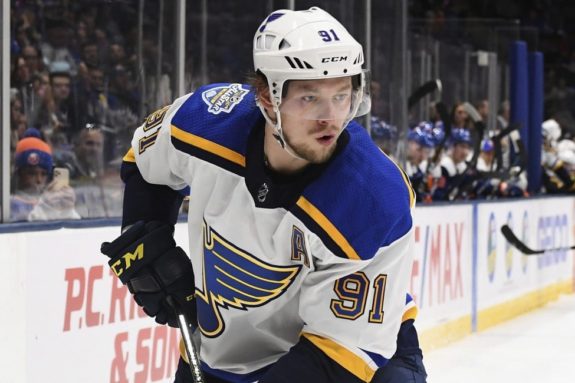
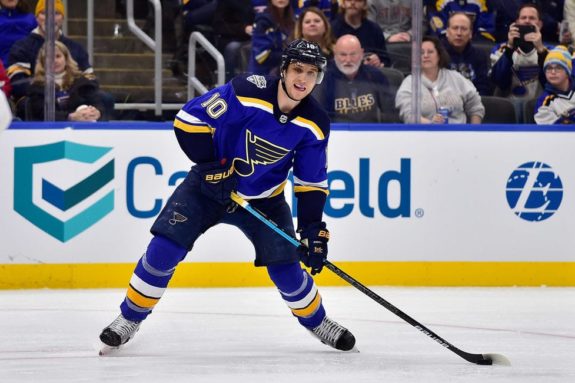
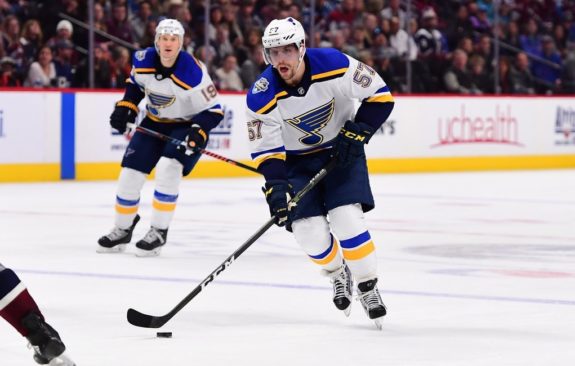
Any of those players could potentially hit 100 points, but it would be a long shot. The Blues also have two young potential superstars in Robert Thomas and Jordan Kyrou, who could develop into that type of player. In a league where scoring is much more difficult than in the 1980s and early 1990s, it’s anyone’s guess who will reach the century mark for the Blues next. But one thing is certain: they’ll be in good company.